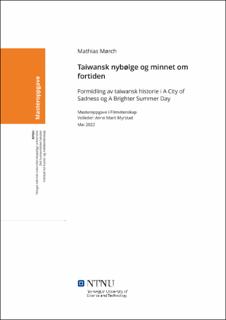| dc.contributor.advisor | Myrstad, Anne Marit | |
| dc.contributor.author | Mørch, Mathias | |
| dc.date.accessioned | 2022-07-07T17:21:31Z | |
| dc.date.available | 2022-07-07T17:21:31Z | |
| dc.date.issued | 2022 | |
| dc.identifier | no.ntnu:inspera:104597652:37103860 | |
| dc.identifier.uri | https://hdl.handle.net/11250/3003668 | |
| dc.description.abstract | Denne masteroppgaven undersøker hvordan filmene A City of Sadness og A Brighter Summer Day formidler taiwansk historie gjennom sine filmfortellinger. Oppgaven undersøker den taiwanske historien som det sentrale elementet i filmene og ser på ulike strukturelle og visuelle aspekter for å forstå hvordan den taiwanske etterkrigshistorien formidles og hvorvidt filmene fungerer som enten nasjonalistiske eller nasjonsbyggende kulturelle verk. Analysen av filmene baserer seg på relevant filmteori relatert til nasjonal film og relevansen av historie og minner i historiefilm. Kognitiv filmteori er grunnlaget for analysen av filmenes strukturelle formidling av taiwansk historie. Oppgaven konkluderer med å konstatere viktigheten av filmenes rolle i å formidle historie fra perioder med sensur og deres evne til å bevare et folkeminne som kort tid før filmenes produksjon var vanskelig å diskutere offentlig. Oppgaven belyser hvordan film kan ha en relevant rolle som arena for formidling av historie, spesielt i nasjoner som tidligere har opplevd sensur og mangel på reelle fremstillinger av fortiden. | |
| dc.description.abstract | This master's thesis examines how the films A City of Sadness and A Brighter Summer Day convey Taiwanese history through their film narratives. The thesis examines Taiwanese history as the central element in the films and looks at various structural and visual aspects to understand how Taiwanese post-war history is conveyed and whether the films function as either nationalist or nation-building cultural works. The analysis of the films is based on relevant film theory related to national film and the relevance of history and memories in history film. Cognitive film theory is the basis for the analysis of the films' structural communication of Taiwanese history. The thesis concludes with stating the importance of the films 'role in conveying history from periods of censorship and their ability to preserve a public experience that shortly before the films' production was difficult to discuss in public. The thesis sheds light on how film can have a relevant role as an arena for the dissemination of history, especially in nations that have previously experienced censorship and a lack of real representations of the past. | |
| dc.language | nob | |
| dc.publisher | NTNU | |
| dc.title | Taiwansk nybølge og minnet om fortiden - formidling av taiwansk historie i A City of Sadness og A Brighter Summer Day | |
| dc.type | Master thesis | |
